Tuba factor. The consequences of the Libyan war in the Saharan politics
In 1960 - 1970 - s. A large number of openly artificial states appeared on the map of Africa, whose existence turned into a series of endless wars, coups, uprisings and inter-ethnic clashes. The ethnopolitical situation in the Sahara and Sahel region is particularly complex. Most countries in the region have a clear internal division into the "northern" and "southern" parts. In the "northern", the main population is made up of Arab-Berber peoples practicing Islam, in the "southern" there are African Negroid peoples who can practice both Islam, and Christianity, and traditional beliefs. In turn, the Arab countries of North Africa also have, usually in the southern regions, a significant non-Arab substrate - again, the same Berbers, who have their own culture and do not want to live in an Arab state as "second-class citizens." The civil war in Libya became a catalyst for centrifugal tendencies in the political life of the Sahara and Sahel. After the Libyan events, the war in Mali became most famous, the main participants of which were several parties: government forces defending the interests of the negroid elites of the South of Mali; Islamic fundamentalists who are fighting to build a Shariah state in Mali and are supported by the Arab and, in part, the Tuareg population; Tuareg separatists who spoke for the creation of Azawad, the independent state of the Tuareg Sahara. In the war in Mali, the French contingent came out on the side of the government troops - the former metropolis is still not going to weaken control over the former colonies in Africa.
As a result of the bloody war in Mali, the whole world learned about the Tuareg national liberation movement, about the desire of the Tuareg Mali to secede from the negroid South and create their own state Azawad. However, a similar situation to the east of Mali - in Southern Libya and Northern Chad - is much less well known. Here, representatives of the Tubu people - local nomads, whose lifestyle has a certain similarity to the Tuareg, are increasingly talking about their interests and the right to self-determination. Tubu played a significant role in the Civil War in Libya, supporting the opponents of Gaddafi and making considerable efforts to overthrow the Jamahiriya. Tom had his own reasons, which we describe below. But now the tuba are in opposition to the new Libyan regime and are very unhappy with the results to which the anti-Caddaphist revolution has led in practice.
"Mountain people" from the plateau Tibesti
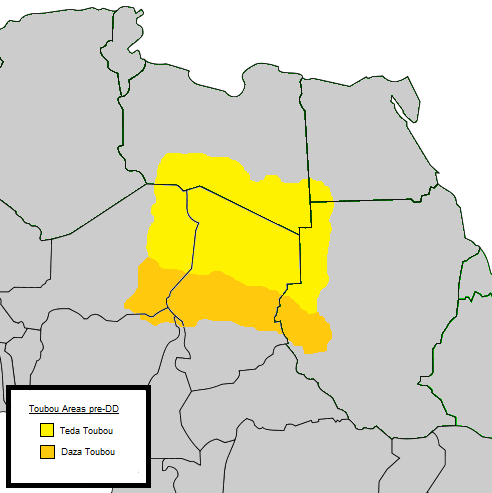 Tubu - semi-nomads living on the Tibesti plateau. The name “tibba” in Arabic means “mountain man”. They are often called among the most hardy people on the planet. It is said that the tuba is able to eat a single date for a whole day - and this can be believed by looking at these lean, wiry people who survive in the harsh conditions of the Tibesti plateau and the sands of the Sahara. In terms of language, the tuba belong to the Saharan family of the Nilo-Sahara macro family and are divided into two main groups - teda (northern) and daza (southern). The number of tuba is small - it does not exceed 350 thousands of people living in the north of Chad, as well as in the north-east of Niger and in the south of Libya. Tubu - Muslims - Sunnis, but the religion is less fanatical than the neighboring Arab tribes. Here, as we see, there is also a certain commonality with the Tuaregs. On the territory of Niger, the Tubu is compactly populated by the Kawar area, surrounded by the Tenere Desert. There are ten oases in Kavar, including Bilme, Dirku, Anya and Segedin. Medieval Kawar played a crucial role in salt mining and the cultivation of dates, and the transport importance of Kawar as a stopping point on the trans-Saharan highway remains to this day. Tubu, inhabiting Kavar and making up the main population here, consider Sultan Kawara, whose residence is in the Anya oasis, to be their head.
Tubu - semi-nomads living on the Tibesti plateau. The name “tibba” in Arabic means “mountain man”. They are often called among the most hardy people on the planet. It is said that the tuba is able to eat a single date for a whole day - and this can be believed by looking at these lean, wiry people who survive in the harsh conditions of the Tibesti plateau and the sands of the Sahara. In terms of language, the tuba belong to the Saharan family of the Nilo-Sahara macro family and are divided into two main groups - teda (northern) and daza (southern). The number of tuba is small - it does not exceed 350 thousands of people living in the north of Chad, as well as in the north-east of Niger and in the south of Libya. Tubu - Muslims - Sunnis, but the religion is less fanatical than the neighboring Arab tribes. Here, as we see, there is also a certain commonality with the Tuaregs. On the territory of Niger, the Tubu is compactly populated by the Kawar area, surrounded by the Tenere Desert. There are ten oases in Kavar, including Bilme, Dirku, Anya and Segedin. Medieval Kawar played a crucial role in salt mining and the cultivation of dates, and the transport importance of Kawar as a stopping point on the trans-Saharan highway remains to this day. Tubu, inhabiting Kavar and making up the main population here, consider Sultan Kawara, whose residence is in the Anya oasis, to be their head. The historical region of the Tubu in Chad, their “patrimony” is the Tibesti Highlands in the Central Sahara, formed by five volcanoes and represents a kind of “lunar landscape” with geysers and springs that feed the Saharan rivers. Most of the tuba living on the plateau are engaged in cattle breeding, breeding camels, donkeys, sheep and goats, and also accompany the following caravans through Central Sahara. The guarding of caravans, as well as the attacks on them with the aim of robbery, were a long-time source of income for the Tubu tribes, which also related them to the Tuaregs. Like the Tuareg, the tuba was considered below its dignity to be engaged in farming in the oases, in the date groves, representatives of the slave caste — the Kamadiya — worked, and later their descendants, who were at the bottom of the social hierarchy of the tuba. Also, with the help of the descendants of slaves, salt is mined - another salary for the tuba. The lower strata of the Tubu society are represented by the descendants of the agricultural African peoples captured in Southern Chad, and the Tuba themselves, despite their dark skin color, often have features that are not typical of African Negroids. Meanwhile, the tuba is still “darker” and “negroid” than the Tuareg and, moreover, the more northern Berber peoples of Algeria and Libya. In the families of the tuba, as in the Tuareg, the wives have a great influence, including participation in solving such issues as changing pastures, buying and selling livestock. Tubu families consisting of parents and children form clans that are the basis of social organization and the owners of palm groves, pastures and water sources. Inside the clan, it is forbidden to commit any mercenary and violent crimes, respectively, there is a vendetta for murder or deadly insult, but it works only between families, not extending to the clan as a whole. There is also a custom of compensation, in accordance with which it is possible to pay off a certain number of camels - the main wealth of the tuba. At the head of the social hierarchy of Tubu society are the privileged clans of tomarg, gund and arn. Below are the ordinary nomads - the commoners, they are warriors. To the lower castes are "aze" - blacksmiths and "kemaya" - farmers who grow dates.
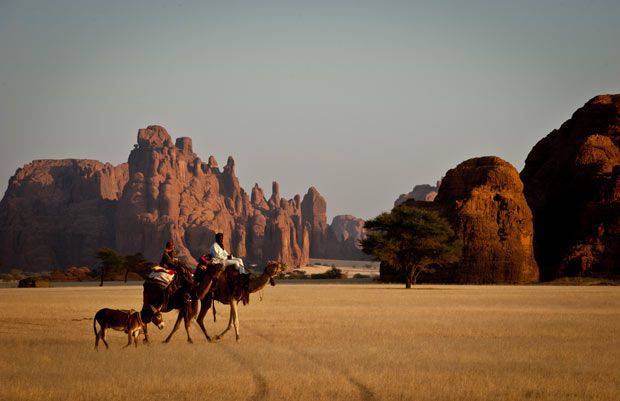
As for the political organization, the statehood of the tuba was virtually absent. Only Ted, who live in the highlands of Tibesti, has a “derde” - the traditional king, a representative of the Tomagra clan, who exercises judicial authority and is engaged in resolving disputes. Despite the fact that the Teda community consists of 36 clans, the derde is elected exclusively from representatives of the Tomagra clan. In the second half of the XVI century. A procedure was established for electing a derde from among the representatives of the three royal families of the Tomagra clan - Arami, Erdi and Lai. These families date back to the sons of the first derde Moley, whose name was Arami, Erdi and Lai. The coronation of the derde takes place under the sacred acacia "tari", after which the derde receives a sign of royal authority - the whip "Ogoli". An obvious relic of traditional beliefs is the conviction that the derde does not die, but only “hide the face”. That is what should be said when the next king leaves Ted Tibesti. From the end of the 17th century, under the leadership of their derdas, Teda raided agricultural oases — to the south, to Born (Chad territory) and to the north, to Fezzan (Libya). In 1842, the city of Teda came into conflict with the Arab tribe of the auluad Suleiman, who lives in the south of Libya. Since then, for more than one and a half centuries, the conflict periodically flares up with a new force - after all, in Fezzan, ted and the Arabs are economic and military-political competitors. Around the same time, the Islamic Order of the Senussiya, very common in Libya, penetrated into Tibesti. It was the Senussites who led the Libyans to the Italians. Representatives of the Order of Senusii in Tibesti were invited by the then derde himself, after which the final Islamization of the tuba began, which until then had been rather conditional. As a result of the activities of the senusit preachers, the zavizya of the order was created in Bardai, the most important oasis of Tibesti. The first attempts of the French to colonize Tibesti and incorporate a plateau into their colonies met with desperate resistance to the tuba. Derde turned for help to Ottoman Turkey, which responded to the call of the co-religionists and established several forts in Tibesti. However, later, after Turkey ceded Libya to Italy, she was forced to abandon the forts in Tibesti, having withdrawn her troops from the habitat of the tuba.
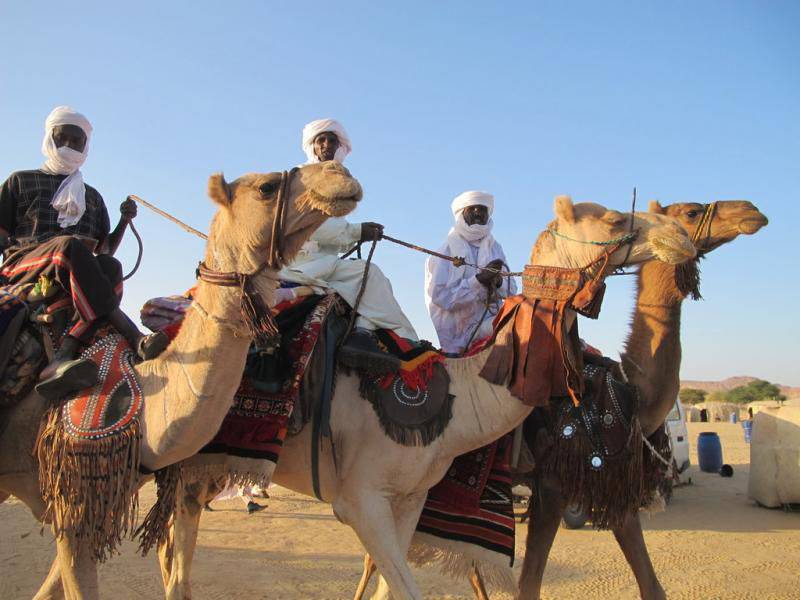
Tubu in Chad: the struggle for national rights and war
In 1914, French units arrived in Tibesti, but the French managed to establish at least some semblance of control over the region of residence of the tuba only by 1930. At the same time they had to go to the preservation of the power of the derde, who, in exchange for certain privileges, began to cooperate with the colonial authorities. In 1960, the independence of the new state of Chad was officially proclaimed. However, initially only the southern regions of Chad, inhabited by the negroid Christian population, gained sovereignty. By virtue of the Christian faith and greater Europeanization, the Southerners were considered more loyal to France and more developed for independence. The northern, "wild" regions of Tibesti were decided to leave under the direct control of France until such time as the central government of Chad found it capable of organizing the management of the northern provinces. Given the religious and ethnic differences, the unification of North and South Chad seemed very problematic. The Muslims of the Tuba did not want to live in the same state with sedentary Negroids - Christians, because historically they considered the latter to be tributaries and suppliers of slaves and could not accept the fact that they would be ruled by immigrants from the south. In 1965, France gave Borku - Ennedy - Tibesti, i.e. the territory of Northern Chad, under the control of the central government of Chad. At the head of Chad in this period was Francois Tombalbai (1918-1975) - an entrepreneur and a former school teacher, a native of the southern Sara people, professing Christianity. Tombalbai showed himself a short-sighted politician and, like many other African leaders, established a tribal regime, pushing representatives of his clan to leadership positions. Even in the northern regions of Chad, officials from the south were appointed, which allowed northerners to consider themselves discriminated against southerners. Dissatisfaction with the policies of the central government reached such a level that the leaders of the tuba decided to start an armed struggle against the Tombalbai regime.
1 November 1965 a Ted uprising broke out in the province of Gero, in the north of Chad, led by then-Derde Oueddai Kichidemi. Derde became a symbol of resistance to the Tombalbai government and the leader of the Tubu national liberation movement. Soon, the derde at the head of his people migrated to the territory of neighboring Libya, being out of reach of the central authorities of Chad. However, the most influential organization of the Chadian opposition of the “northerners” was the Front for National Liberation of Chad (FROLINAT), created by 19 on June 1966 at a congress in Sudan. The Islamist Front for the Liberation of Chad, led by Ahmed Hassan Moussa, and the left-wing National Union of Chad, led by Ibrahim Abach, a Marxist and a supporter of Pan-African socialism, joined FROLINAT. The latter was elected chairman of the organization. The core of the front was originally composed of supporters of Ibrahim Abachi - Muslims by religious affiliation and socialists for political convictions. FROLINAT proclaimed as its tasks the nationalization of key sectors of the Chadian economy, the introduction of Arabic and French as official languages, the conduct of the cultural revolution, the withdrawal of foreign troops from the country, and wage increases. At the same time, the front distanced itself from religious and ethnic contradictions and opposed the division of the country along ethnoconfessional grounds. Apparently, this was the reason for the separation of Ahmed Hassan Moussa from the Islamist front. FROLINAT unleashed an active armed struggle on the territory of Chad. In 1968, the leaders of the FROLINAT succeeded in gaining the support of Gukuni Oeddei, the son of Derde Oeddey Kichidemi. Gukuni at the head of the detachments of the tuba joined the uprising. By this time, the founder of the front, Ibrahim Abacha, was killed in battle, then Mohammad Taher, who replaced him, was killed. The front split into two armies - the 1 army of FROLINAT, in which Abba Seddik advanced to the first positions, and the 2 army of FROLINAT, headed by the heir of the derd Gukuni Waddey (pictured).
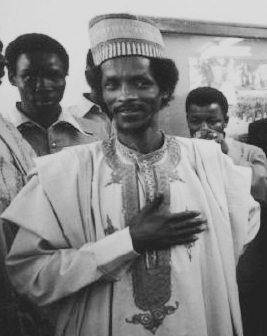 Hissen Habré acquired important positions among the inhabitants of the north of the country. A bloody civil war began in Chad, which effectively split the country into two halves and turned North Chad, where the tube lives, into an area uncontrolled by the central government of the country. In the same 1968, Mr Tombalbai, who was on the verge of complete overthrow, turned to France for help. The units of the Foreign Legion that were deployed in Chad defeated the FROLINAT units and pushed them back to the north of the country, but the French leadership demanded that Tombalbai meet the demands of the northerners and bring them into the government. However, Tombalbai, who initially met the French demand, as soon as France withdrew the Foreign Legion from Chad in 1971, again set to work for the old. He adopted the concept of African identity, announced his return to traditional cults, and banned Christianity and Islam, which led to a new uprising and renewed civil war in the country.
Hissen Habré acquired important positions among the inhabitants of the north of the country. A bloody civil war began in Chad, which effectively split the country into two halves and turned North Chad, where the tube lives, into an area uncontrolled by the central government of the country. In the same 1968, Mr Tombalbai, who was on the verge of complete overthrow, turned to France for help. The units of the Foreign Legion that were deployed in Chad defeated the FROLINAT units and pushed them back to the north of the country, but the French leadership demanded that Tombalbai meet the demands of the northerners and bring them into the government. However, Tombalbai, who initially met the French demand, as soon as France withdrew the Foreign Legion from Chad in 1971, again set to work for the old. He adopted the concept of African identity, announced his return to traditional cults, and banned Christianity and Islam, which led to a new uprising and renewed civil war in the country. In 1975, Mr. Tombalbai decided to remove his own environment — high-ranking military people who belonged to southern nations. As a result of the military coup Tombalbai was killed. The country was headed by Brigadier General Felix Mallum (1932-2009) - also a native of the Sara, a tribal member of Tombalbai, who served for a long time in the French colonial troops and even fought in Indochina, and later made a career in the Chadian armed forces. Mallum took a course on solving the ethnic and confessional problems of the country and took steps towards normalizing relations with Muslims of the North, whose representatives were included in the government. Mallum managed to normalize relations with Egypt and Sudan, but relations with Libya remained very tense. The situation was complicated by the fact that the tuba, which formed the basis of the opposition to the central government, lived in Chad and Libya, and the Libyan leader Muammar Gaddafi had the opportunity to influence intrachadal politics through Libyan tuba who had contact with fellow tribesmen in Chad. In 1976, Libyan troops occupied the Ausu strip, which Libya has long claimed. In parallel, Libya supported the part of the FROLINAT that went after Gukuni Oeddeem - again, guided by their own strategic considerations. After all, Waddey, in principle, did not object to the occupation of Auzu, paying with his territory for political, military and financial support from Libya.
Chadian war and its consequences
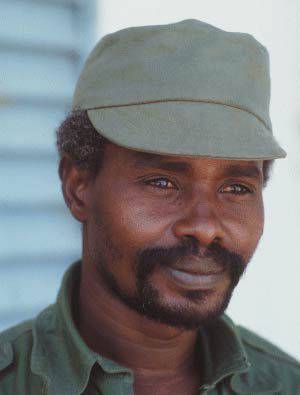 The Libyan invasion of Chad marked the beginning of a history of large-scale confrontations between Libya and Chad, and the opposing factions of the “northerners” fought for both sides. From the very beginning, Gukuni Waddey maintained relations with Libya and focused on Gaddafi, while his rival for influence among the Northmen Hissen Habré (in the photo) was a categorical opponent of the Libyan annexation of the Ausu band and enlisted the support of Western countries. With the help of the Libyan army, Gukuni Oueday, by 1978, managed to oust the units loyal to Hissen Habré and establish control over Northern Chad. Then Hissein Habré made an alliance with the President of Chad, Felix Mallum, who managed to enlist the support of France. Habré was appointed prime minister of the country, but the contradictions between the North and the South were so insurmountable that the union of Mallum and Habré did not last long. In February, 1979 began an armed confrontation of supporters of Mullum and Habré. As a result of the fighting, the control over Northern Chad was completely in the hands of Oudeday and his faction FROLINAT, and the central government virtually ceased to exist. Mallum fled the country and in November 1979 a coalition government of Chad was created under the leadership of representatives from both the North and the South. Gukuni Wedde was proclaimed president of the country, the leader of the Southerners, Colonel Abdelkadar Kamuga - Vice-President. The leadership of the country's armed forces also turned out to be in the hands of the northerners - Hissen Habré became the Minister of Defense. However, soon the confrontation between Habré and Oudedey was resumed. The fighting led to the mass flight of civilians in Chad to neighboring Cameroon, and the capital of Chad, N’Djamena, in December 1980, with the help of Libyan troops, was captured by Oeddej. In January, 1981. Ouedday announced the intention to unite Libya and Chad into the Islamic Republic of the Sahel. However, almost all residents of the south of the country took this idea extremely negatively, fearing that the real power in the country would be in the hands of Libyans, and Muslims would begin to discriminate against the numerous Christian population of the southern provinces. Armed clashes between various pro-Libyan and anti-Libyan groups operating in Chad were resumed.
The Libyan invasion of Chad marked the beginning of a history of large-scale confrontations between Libya and Chad, and the opposing factions of the “northerners” fought for both sides. From the very beginning, Gukuni Waddey maintained relations with Libya and focused on Gaddafi, while his rival for influence among the Northmen Hissen Habré (in the photo) was a categorical opponent of the Libyan annexation of the Ausu band and enlisted the support of Western countries. With the help of the Libyan army, Gukuni Oueday, by 1978, managed to oust the units loyal to Hissen Habré and establish control over Northern Chad. Then Hissein Habré made an alliance with the President of Chad, Felix Mallum, who managed to enlist the support of France. Habré was appointed prime minister of the country, but the contradictions between the North and the South were so insurmountable that the union of Mallum and Habré did not last long. In February, 1979 began an armed confrontation of supporters of Mullum and Habré. As a result of the fighting, the control over Northern Chad was completely in the hands of Oudeday and his faction FROLINAT, and the central government virtually ceased to exist. Mallum fled the country and in November 1979 a coalition government of Chad was created under the leadership of representatives from both the North and the South. Gukuni Wedde was proclaimed president of the country, the leader of the Southerners, Colonel Abdelkadar Kamuga - Vice-President. The leadership of the country's armed forces also turned out to be in the hands of the northerners - Hissen Habré became the Minister of Defense. However, soon the confrontation between Habré and Oudedey was resumed. The fighting led to the mass flight of civilians in Chad to neighboring Cameroon, and the capital of Chad, N’Djamena, in December 1980, with the help of Libyan troops, was captured by Oeddej. In January, 1981. Ouedday announced the intention to unite Libya and Chad into the Islamic Republic of the Sahel. However, almost all residents of the south of the country took this idea extremely negatively, fearing that the real power in the country would be in the hands of Libyans, and Muslims would begin to discriminate against the numerous Christian population of the southern provinces. Armed clashes between various pro-Libyan and anti-Libyan groups operating in Chad were resumed. Ultimately, Gaddafi abandoned the idea of uniting with Chad and, in 1982, he withdrew his troops from the country. After this, Habré’s troops, with the support of the United States and Egypt, liberated N’djamena, and Oeddey emigrated to Libya. In the oasis of Bardai, the “Provisional Government of National Salvation”, faithful to Waddey, was formed, the troops subordinate to which in 1983 took the offensive and again took control of a significant part of the country. Habré turned for help to France, which by the forces of the Foreign Legion was able to dislodge the troops of the FROLINAT from the captured Fayy-Largeau. Libya again intervened in the situation, whose armed forces went on the offensive and defeated Habré. The war continued until 1986, when November 18 did not reach an agreement on the cessation of hostilities, which was signed by Habré, Oueddy and Kamug. Libya war in Chad was very expensive - at least 7000 Libyan soldiers were killed in military clashes with Chadian and French troops, which caused dissatisfaction with the policy of Gaddafi even among the highest officers of the Libyan army loyal to him.
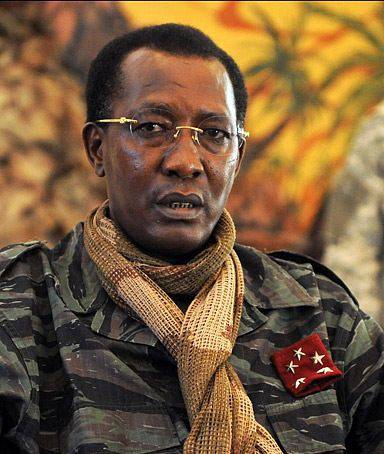
In 1990, Chad was headed by Idris Debi (pictured) - a native of the northern bidey people, a subethnos of the Zaghawa people who are related to the tuba. Before Debi fought on the side of Hissen Habré and participated in the overthrow of Gukuni Oedday, but then he was accused last of the conspiracy and fled to Libya, and then to Sudan. In 1990, in a few months, detachments under the command of Debi, operating from the territory of Sudan, managed to occupy a significant part of the territory of Chad, and 1 in December, 1990, to enter the capital of the country, N’djamena. Having seized power, Deby headed for the integration of the country. The brother of Idris Déby, with the support of the latter, was made the Bidey Sultan, which strengthened the position of the president among the tribes of Northern Chad. Idris Déby is the President of Chad and is currently maintaining power throughout the last quarter of a century. In 1993, Mr. Gukuni Wedde announced the dissolution of FROLINAT, which has virtually outlived itself in modern conditions. However, Chad’s central government’s control over the Tuba’s regions remains highly elusive — in fact, the Tuba continues to live by its own laws, playing an important role in the trans-Saharan transport connection and controlling the most important land routes from Chad and Niger to the countries of North Africa. In 2010, a new derde teda Erzei Barka took the throne, enjoying the support of the country's president Idris Debi and Gukuni Oeddey. Unlike Oedday, Hissen Habré is still in disgrace. Back in 2008, the Chadian court sentenced him to death in absentia, and in 2013, Habré was arrested in Senegal and placed in a Senegalese prison. In July, 2015 in Senegal began the trial of Hiessen Habré. The Chad politician is accused of repeated human rights violations, and the Chadian authorities accuse Habré of organizing murders of at least 40 thousand people and misappropriating 70 million French francs. For a long time, relations between Chad and Sudan remained tense, since the President of Chad, Idriss Debi, by nationality, supported the rebels operating in Sudanese Darfur against the central government of the country. As you know, Darfur is inhabited both by the Zagawa and by some other kindred peoples, which contributed to the support of the Darfur rebels by the Chadian authorities.
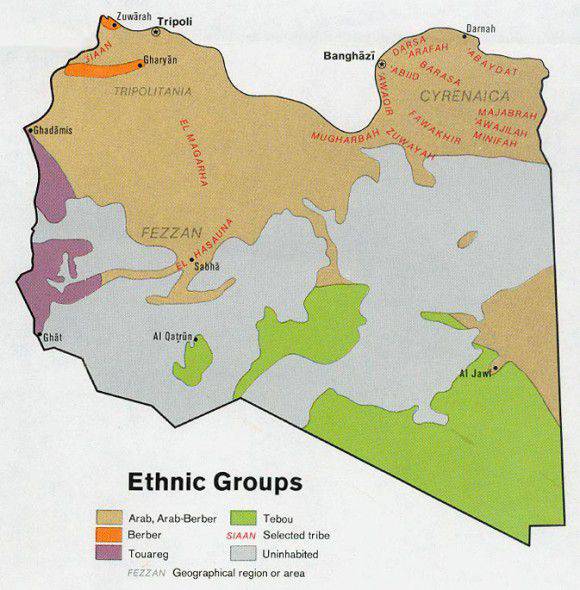
Tubu in Libya: Gaddafi Politics and Uprisings
However, if in Chad, Gaddafi was focused on supporting part of the tuba led by Oeddei, then in Libya itself the position of the tuba left much to be desired. There are at least 50 thousands of representatives of this nation living in vast areas in the south of Fezzan. As in neighboring Chad, in Libya, the tuba are traditionally engaged in nomadic cattle breeding, cultivating dates, salt mining and organizing trade through the Sahara. Gaddafi, a former Arab nationalist, was interested in the "Arabization" of all Libya and the integration of all national minorities in the country, including the tuba, into the Libyan Arab nation. Moreover, if Gaddafi managed to establish good relations with the Tuaregs, a significant part of the Libyan tuba was dissatisfied with his policy towards their people. Tuba was accused of “Arabization” of Gaddafi’s regime, of political discrimination and deliberate inhibition of the development of social infrastructure in the regions where they live. The situation was aggravated by the fact that the Tubu consider themselves the indigenous inhabitants of the Sahara, its historical population, and do not want to put up with the dominance of the Arabs. In 2007, the Gaddafi regime took the initiative of depriving the Tuba of Libyan citizenship, declaring them to come from Chad. Formally, the basis for such an assertion is that many Libyan tubas spend a significant part of the year in neighboring Chad, where they put their nomads. But the tuba, like other trans-Saharan nomads, the same Tuareg, do not recognize the existing state borders and consider themselves to be “free inhabitants of the Sahara”, who have the right to live and feed herds where they wish. This feature of the lifestyle and business of the Libyan tuba was used by the Gaddafi regime, using the “nomadism” tuba as a clue to reduce their numbers in the territory of Libya. The tuba began to methodically “survive” from the territory of the country, seeking to free the oases they occupied for the Arabs. Children from families of the tuba were denied access to medical care and educational services. Finally, Gaddafi patronized the Arab tribes inhabiting Fezzan. This was another reason for the growth among the tuba of anti-caddaphism, which led to an armed uprising in November 2008.
- flag of the National Tube Salvation Front
The leading role in the speech was played by the National Tube Salvation Front, created as an armed organization and led by Isa Abdel Majid Mansur. Isa Mansur is a key political figure representing the interests of tribal groups in Libyan politics. Under his leadership, the Libyan tuba raised an armed uprising, which was suppressed by government forces. 33 man died, after which Muammar Gaddafi began to implement a program to evict the tube from the territory of Libya. The operation to evict the tube was carried out by quite tough methods, with arrests and the destruction of dwellings. Naturally, in this situation, the tuba was supported by the Western powers, despite the formal improvement of relations with Gaddafi, who were “digging” under the Libyan leader. When a civil war broke out in 2011 in Libya, the leaders of the Tuba unconditionally supported the rebels, hoping to get their preferences from it. Militia Tubu has come forward with weapons in the hands against the government troops Gaddafi and took control of a number of settlements in the south of the country. Moreover, the tuba played a crucial role in blocking the entry of mercenaries from Chad and Niger into Libya, who could get into Fezzan only through territories controlled by the Tuba militia. The last mercenaries were not allowed through their territory, and where necessary they acted with arms in their hands. Believing in a change in the situation after the overthrow of Gaddafi, the leader of the national Tuba movement, Isa Abdel Majid Mansour, announced at the end of 2011 about the dissolution of the National Tube Salvation Front "as unnecessary" in the changed political conditions. That is, the leaders of the tuba expected to normalize relations with Tripoli and were convinced that the situation would not return to a state of armed conflict.
Confrontation with PNS and IG
However, the tribal leaders very quickly became disillusioned with the policies of the new Libyan regime, more precisely, with the results of overthrowing Gaddafi, since the pro-Western rebellion did not bring the long-awaited national liberation. Instead, the natives of Southern Libya faced a whole series of “new” old problems, including the resumption of rivalry with Arab tribes that performed traditional tuba rivals in the region. In March, 2012, there were bloody clashes between the tuba and the Arabs of the Auliad Suleiman tribe in the southern Libyan city of Sebha. Near Sebha, there are fresh underground lakes that play a crucial role in the water supply of the entire country and are of strategic importance to Libya. Since the beginning of the clashes in Sabha, hostilities have resumed in the south of Libya, between the Tuba militia, which was led by the Sebha militia, and detachments of the Arab Zuvayan tribe. Zuvaya is an Arab tribe, formerly engaged in the slave trade and raided the negroid population of the South Libyan oases. A significant part of the representatives of Zuvay, however, was born from marriages with black slaves. The Tuba has a historical grievance against the Zuvayas, which in the 1840s. they migrated to the Kufra oasis area, taking away palm plantations from the tuba and displacing the tuba to the south. At one time, the Zuvayas supported Gaddafi, for which he gave them control over the trans-Saharan trade. However, later the tribe still supported the rebels, hoping to win their dividends from it. One of the reasons for the clashes was the struggle for control over the southern borders of Libya, which was originally given to the Tube National Transitional National Council in recognition of their help in overthrowing Gaddafi. For Tubu, border control was very important, as they always played an important role in the trans-Saharan trade, including the smuggling of drugs and weapons. At the same time, armed groups of the tuba were used to protect fields in the south of the country. In July, 2012, when the forces of the Libyan Transitional National Council came out against the tuba in the Kufra oasis, where the tuba and the Zuvayas clashed, the leaders of the tuba announced a possible boycott of the upcoming elections in the country. In addition, the tuba was outraged by the lack of representation in the Constitutional Commission and boycotted the elections to it in July 2013. In protest against the “PNS discriminatory policy”, the tuba units that carried the field protection service blocked the fields and stopped mining operations. In March, 2014 passed a new wave of protests against the new Libyan government, accompanied by new clashes with Arab tribes. The Libyan government was even forced to impose a state of emergency on the territory of the southern regions of the country.
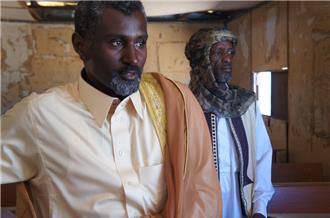 Isa Abdel Majid Mansour (in the photo) announced the resumption of the activities of the National Tube Salvation Front as the only force capable of preventing discrimination against his people and protecting their interests. According to the leader of the tuba, the PNS and the leaders of the Arab tribes are interested in changing the demographic situation in Libya and artificially underestimate the number of tuba in the country. The authorities only talk about 15 000 tuba living in Libya, while the tuba themselves estimate their numbers in 150 000 - 200 000 people (and some sources call the number in 300 000 people, which, however, does not look very plausible). The “Arabization” of Southern Libya has the distinct economic interests of the Arab tribes, who see in exile, or at least political and economic weakening of the tuba, the possibility of establishing full control over the trans-Saharan trade routes.
Isa Abdel Majid Mansour (in the photo) announced the resumption of the activities of the National Tube Salvation Front as the only force capable of preventing discrimination against his people and protecting their interests. According to the leader of the tuba, the PNS and the leaders of the Arab tribes are interested in changing the demographic situation in Libya and artificially underestimate the number of tuba in the country. The authorities only talk about 15 000 tuba living in Libya, while the tuba themselves estimate their numbers in 150 000 - 200 000 people (and some sources call the number in 300 000 people, which, however, does not look very plausible). The “Arabization” of Southern Libya has the distinct economic interests of the Arab tribes, who see in exile, or at least political and economic weakening of the tuba, the possibility of establishing full control over the trans-Saharan trade routes. The aggravation of relations with Tripoli contributed to the revival of the idea of autonomy of the country among Libyan tubas. Supporters of national autonomy questioned the ability of the government to ensure the security of populated areas in the Tuba region and accused the PNS of continuing discrimination. Autonomic sentiment intensified after PNS officials stated that the Tubu and Tuareg have “fake IDs” and, accordingly, are not Libyan citizens. In September, 2014 leaders signed an agreement with the Libyan general Khalifa Haftar, a former major military official of the Gaddafi regime, who fled to the West during the Libyan-Chadian war. Currently, Khalifa Haftar, who returned to Libya and occupied the post of commander of the land forces from the rebels, is the main opponent of the intensification of Islamist groups in Libya, including the Islamic State organization. The fact is that most of the tuba have a rather negative attitude towards the activities of radical fundamentalist groups in Southern Libya. Moreover, the tuba, including seeking to enlist the support of the West and the world community, position themselves almost as “the main shield in the fight against IS”. This is also due to the peculiarities of the Tubu culture, which have never been characterized by high religiosity. However, the IG does not leave attempts to persuade young people to take the tube to their side, launching a number of propaganda videos in the Tubu language in March of 2015 in March. However, it can be assumed that the fundamentalists will not succeed in luring the tube to their side (separate singles and small groups are not counted), since in the south of Libya, the Arab tribes personify, first of all, the Arab tribes who are traditional opponents of the tube. transsahar trade. In addition, the relations between the tuba and the Tuaregs, also long-standing competitors in the control of trade routes, have become aggravated. After all, the Tuareg initially supported Gaddafi, and lately among the part of the Tuareg, the popularity of fundamentalist groups is slowly growing. In May, 2015 in the Obari oasis region began armed clashes between the tuba and the Tuaregs, supporting fundamentalists. The resumption of clashes worried the central government in Tripoli, concerned about creating the illusion of restoring order in the country.
Thus, we see that the withdrawal of Gaddafi only contributed to the regress of political relations in the Sahara, bringing the situation in the region back to the level of even pre-colonial politics - tribal confrontations of the tuba and the Arabs, the tuba and the Tuareg, the Arabs and the Tuareg. It is likely that Libya will also face the problem of neighboring Sudan - the desire of tribes of African descent, in this case the tube, to create national autonomy, or even an independent state - in the style of South Sudan. At least the peoples of Darfur who are related to the culture of the Tuba have long been fighting for national liberation against the central government of Sudan. However, time will tell whether freedom-loving tuba will turn into an African equivalent of Kurds opposing the expansion of fundamentalists. At least, while the tube does not receive serious assistance and support from Western countries, the military and political situation in southern Libya is rather poorly covered by the world media, especially in the context of the “tube problem”. Obviously, in the event of further disintegration of Libya, which seems to be becoming inevitable, the tube in the future will increasingly insist on the formation of its own sovereign state. In fact, this nation, which remains divided between the three Saharan states - Libya, Niger and Chad, has a compact territory of residence, which can become the territory of a new state. It is possible that the emergence of the Libyan tuba as a political subject of autonomy will resume centrifugal reactions in neighboring Chad, leading to the resumption of the national liberation struggle of Ted Tibesti, and will also stir up the still calm Niger tuba.
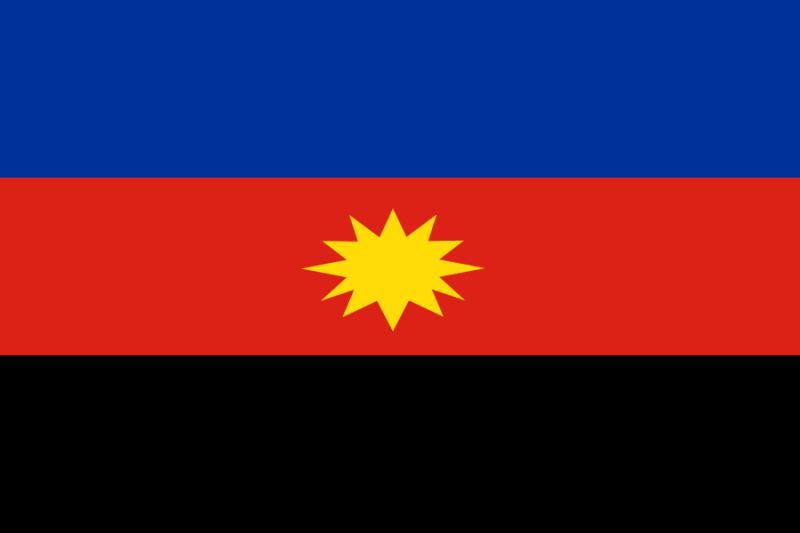
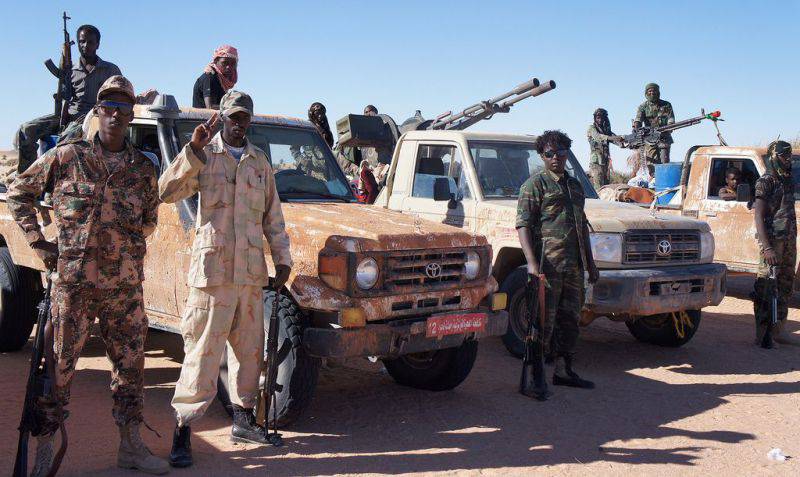
Information